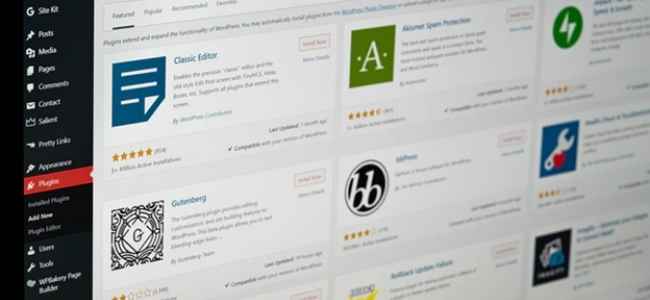When you start a new blog, it can be tempting to pick a free blogging platform.
However, this may not be the right decision if you are after success. One reason is that the features of free blogging platforms are limited. Monetizing the blog, making a design that stands out, and customizing the site however you like may be difficult or impossible.
With this in mind, the self-hosted version of WordPress (available from WordPress.org) is an excellent solution. It’s a content management system (CMS) that powers more than 42% of all websites.
Both beginners and advanced bloggers can capitalize on a number of benefits that WordPress offers. We’ll cover them in the eight sections below.
1. A Personalized Domain Name
Free blogging platforms incorporate their branding into your domain name. Instead of having a web address like yourname.com, your site’s name would follow a pattern similar to yourname.platformname.com.
The addition of the platform name makes a website name look unprofessional. The site’s visitors may think that the owner is a beginner who is not willing to invest in a custom domain name.
Therefore, it’s better to buy domain names that only include your brand name and a domain extension like .com or .net to build credibility.
2. WordPress is SEO-friendly
WordPress makes it simple for users to maximize their search engine optimization (SEO).
Optimizing a website for search engines is easy on WordPress. The CMS features an alt text section for each image and custom permalinks, which means you can insert keywords to make your site more appealing to search engines.
WordPress also has SEO plugins that will help your blog rank on search engines. The two of the most popular include Yoast SEO and All in One SEO. These plugins help with content creation by providing a checklist and scoring the content quality.
Moreover, most WordPress themes are SEO-friendly. They have an effective page structure that is optimized for mobile devices.
3. Complete Control of the Website
Unlike free blogging platforms, the self-hosted version of WordPress gives you full control over your website, including blog content and monetization strategies.
Here are several ways to monetize your WordPress blog:
- Creating an online store
- Selling an online course
- Building a premium membership website
- Selling ad space
- Integrating Google Ads
If you use a free blogging platform like WordPress.com, you may experience strict limitations.
The platform permits its personal and free plan subscribers to use affiliate linking and sponsored posts only. Users have to upgrade to at least the Business plan to sell ad space. If they want to build an online store, they must purchase the eCommerce plan.
The self-hosted version of WordPress also features a variety of plugins to extend your website’s functionality, such as growing email lists, building a landing page, and integrating multiple languages. In contrast, WordPress.com only allows plugins for its Business and eCommerce plan subscribers.
4. Full Website Customization
Free blogging platforms have limited generic themes and templates. Meanwhile, the WordPress.org theme depository offers many free themes for specific blog niches, like news, entertainment, and food.
It’s also possible to customize any theme by changing its background and fonts, adding sliders, and featuring your logo.
Some themes even provide special effects and animations to make your website look dynamic. For more options, you can purchase premium themes, like Divi and Uncode, or add custom CSS code yourself.
5. Ability to Build Your Brand
Freedom of customization and control fostered by WordPress will help you create a blog that mirrors your brand identity. You will experience few restrictions when designing the website, creating its content, and adding features. This way, standing out from your competition may be easier.
The New Yorker is an example of a major brand that uses WordPress creatively. The magazine site uses a simple grid layout to maintain the feel of a physical newspaper. To make the site interactive, The New Yorker includes quizzes and puzzles.
6. Community Support
In case you need help to get the most out of your WordPress blog, there are many resources available.
First, there are official sources from WordPress, such as:
- WordPress Documentation. An online manual for WordPress users on a range of topics from basic usage to maintenance methods.
- Support Forums. It is home to a community that will help you troubleshoot any issues.
- Support Handbook. Contains tips, tricks, and advice compiled from the forums.
Many WordPress professionals also run online groups to help beginners on major social media platforms, like LinkedIn and Facebook. Generally, each group covers specific topics, such as WordPress SEO or monetization strategies.
7. No Programming Skills Required
WordPress also has drag-and-drop page builder plugins, including Elementor and WPBakery.
These plugins make it possible to create a beautiful website without having to write code. All you need to do is select a basic layout or website element and drag it to where you want it on the page.
The same goes for many other WordPress plugins, like WPForms, Google Analytics, and WooCommerce. On WordPress, coding knowledge isn’t essential to create a contact form, analyze your website performance, or even build an eCommerce store.
8. WordPress is Inexpensive
The WordPress CMS alone is free, but you have to buy a domain name and web hosting to use it.
Don’t worry – there are hosting providers who charge as little as $2.59/month for a shared hosting plan. Check out a few companies to find the one that suits your needs best.
Some hosting providers’ plans come with extra features, such as an SSL certificate and a free domain name.
A cheap shared hosting plan is usually enough for small blogs. When compared to WordPress.com pricing plans, the many benefits you get from self-hosting WordPress outweigh the alternative.
Conclusion
If you want to build a blog, going with the self-hosted version of WordPress is better than using a free blogging platform. It’s because of a number of benefits, including:
- The ability to personalize your domain name.
- Complete control of the website.
- Vibrant community support.
- Freedom of customization.
- SEO-friendliness.
- No coding knowledge is required.
- Its affordability.
- The ability to build your brand.
That’s why self-hosted WordPress is a great option for hosting your upcoming blog. Even though it will need an upfront investment to buy a hosting plan and a domain name, the cost is worth the increased chances of your blog’s long-term success.




















